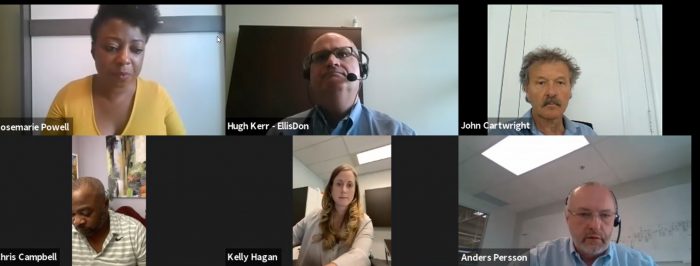The key to successful community benefits initiatives is early engagement with all stakeholders, agreed a panel of industry leaders during a recent panel discussion at the Toronto Community Benefits Network’s annual general meeting.
“From a communications perspective, one of the big lessons learned is finding those opportunities to listen, to engage, to interact with the communities, the businesses and the organizations where these projects are being built because there are a lot of great ideas and advice and partnerships that can come when we are open arms at a table together,” said Kelly Hagan, vice-president, community relations and capital communications at Metrolinx.
“I really think that opportunity of starting much earlier in that collaboration with our stakeholders and partners is very essential to the success of any community benefit agreement and the success of any of these big projects.”
The pandemic has presented a challenge in terms of engaging with stakeholders on community benefit opportunities, she added.

“I am a big believer in being in the community and doing those walks and being right on the street where these projects are being built,” Hagan explained. “I am excited to be able to get into a space where more of that can happen with my team and our partners.”
Getting into high schools and communicating the opportunities to students is also key, said Hugh Kerr, project director at EllisDon.
“People are hungry for information and people are asking ‘how do we become an apprentice? How do we get into the trades?’ ” he noted. “Our lessons learned, or focus, has to be starting to get the message out much sooner so that people understand the process to get into the trades, understand how do they work through the apprenticeship program and make that a more inviting experience.”
Anders Persson, deputy project director at Mosaic Transit Group, said getting access to additional resources in the industry is huge nowadays. One of the lessons learned for Mosaic is that you need to map out your resources and hire somebody for the situation.
“If you have the map early you can plan better for where you can possibly have somebody work and then adopt the situation around them rather than looking for the perfect fit for something you pre-described that you needed or required,” he said.
Denise Andrea Campbell, executive director social development, finance and administration, for the City of Toronto, who has been driving social change initiatives at the city for the last 16 years, was the keynote speaker at the event. She said before the onset of the COVID-19 pandemic community benefits initiatives were seen as an important way to maximize municipal levers to achieve inclusive economic development.
“Now several years later, after slow but steady progress and a global pandemic, there is heightened attention on community benefit initiatives to connect inclusive COVID-19 economic recovery objectives with opportunities for Indigenous, Black and other equity deserving communities who are disproportionately experiencing the negative effects of COVID-19,” she said.
When she started her career she learned an important lesson when trying to secure advancements for BIPOC women.
“What government gives, government can take away, so embedding is critical,” Campbell said. “Community benefits is becoming embedded in policy, staffing and practice at the City of Toronto. That is a big victory. It’s a victory that you and other partners should be proud of and encouraged by…especially as you join us in the next and most important part of our journey: working through complex and complicated details to implement community benefits in Toronto in a way that fulfills its promise to communities.”
Toronto aims to do better, she added.
“When I talk about better, I am talking about achieving community benefits proactively rather than as an afterthought,” Campbell stated. “When it comes to city-funded infrastructure projects, whether it is the development of a community centre or the revitalization of Regent Park, we are not leaving it to community coalitions alone to have to advocate on their own directly to developers. The city has power, responsibility and can have impact in these situations. That is why council committed to adopting the community benefits framework.
“Imagine a city where the community does not have to advocate for community benefits for city-funded public infrastructure projects because they are already built into the mandatory policy requirements. That’s our long-term goal of the community benefits framework.”
Follow the author on Twitter @DCN_Angela.











Recent Comments
comments for this post are closed